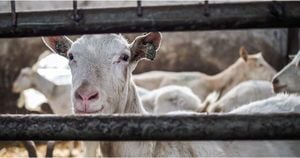South Africa is experiencing heightened diplomatic tensions involving its relationships with Taiwan and the United States, marking a significant geopolitical shift as it navigates demands from both nations.
Recently, South Africa has again called for the relocation of Taiwan's representation from its capital, Pretoria. This move is perceived as part of China's increased pressure on Taiwan, with South Africa seeking to downgrade its diplomatic ties with the island nation. According to Taiwan's Foreign Ministry, these actions signal China's deepening influence over South Africa's foreign policy.
Last year, South Africa initiated requests for the Taiwan Liaison Office to relocate by the end of October, though it later retracted this demand. The South African government reiterated its call for the office to be moved by the end of March this year, aiming to rename it as its "trade office." This continuous insistence showcases South Africa's alignment with Chinese diplomatic preferences, as the country intensifies its efforts to engage with Beijing.
The response from Taiwan's Foreign Ministry highlights the serious diplomatic communication between the two countries. "We maintain our standpoint and will not accept any unilateral changes to our status by the South African government," officials stated, emphasizing principles of equality and respect as they navigate this complex situation.
Heightened tensions are not limited to Taiwan. The relationship between South Africa and the United States has also escalated, particularly after former President Donald Trump threatened to end all US aid to South Africa. On February 2, Trump accused the South African government of land confiscation and treating certain demographic groups poorly—a clear reference to the country’s race-based land reform policies.
"I will cut off all future funding for South Africa until a complete investigation is completed!" Trump proclaimed on his Truth Social platform. His comments followed the recent passing of legislation facilitating land expropriation without compensation, which the South African government argues is necessary to address the injustices and inequalities of the apartheid era.
The historical and political backdrop cannot be overlooked. Since the end of apartheid, South Africa has been striving to redistribute land to the black majority, who were dispossessed during colonial and apartheid regimes. The current government promotes land reform as "a moral, social, and economic necessity" and has set targets to address racial disparities in land ownership.
The current tension with the US stems from these land reform policies, which are portrayed by some as racially motivated and discriminatory. Critics of the government, including prominent figures like Elon Musk, have publicly accused South Africa of racism against white landowners. Musk, who has been vocal about the need for equitable treatment of all races, questioned the legitimacy of property laws governing land ownership on his social media channels.
Responding to Trump’s rhetoric, South African Minister of Mineral Resources Gwede Mantashe firmly stated, "If they do not give us money, we should not give them minerals." Mantashe's comments reflect the government's view of its sovereignty and assertive stance on managing foreign criticisms and aid relations.
Despite these challenges, South African President Cyril Ramaphosa remains open to dialogue. He has expressed an eagerness to engage with Trump directly, hoping such discussions could clarify their respective positions and diminish tensions. Ramaphosa stated, "We believe both sides will reach a mutual agreement through cooperation on the aforementioned issues,” signaling South Africa's preference for diplomatic solutions over conflict.
The broader geopolitical repercussions are salient, as South Africa's relationships with both China and the US are increasingly intertwined. The reliance on US aid for health programs, especially for initiatives dealing with HIV/AIDS, complicates the national strategy. Approximately 440 million dollars worth of support was channeled to South Africa from the US, covering various sectors, including health and development programs.
This complicated diplomatic triangle calls for careful navigation, especially as South Africa seeks to balance its historical ties to the US with the growing economic partnership with China. Trump’s statements and South Africa's land reform policies are at the heart of these diplomatic challenges, proving to be significant hurdles for both nations as they work toward finding common ground.
While the linger of colonial history and racial disparities remains part of the national dialogue, how South Africa manages its relationships with Taiwan and the US could have lasting impacts not only at home but also within the wider African and global geopolitical landscapes. The coming weeks will be pivotal as each nation evaluates its options and consequences amid this climate of diplomatic strain.



